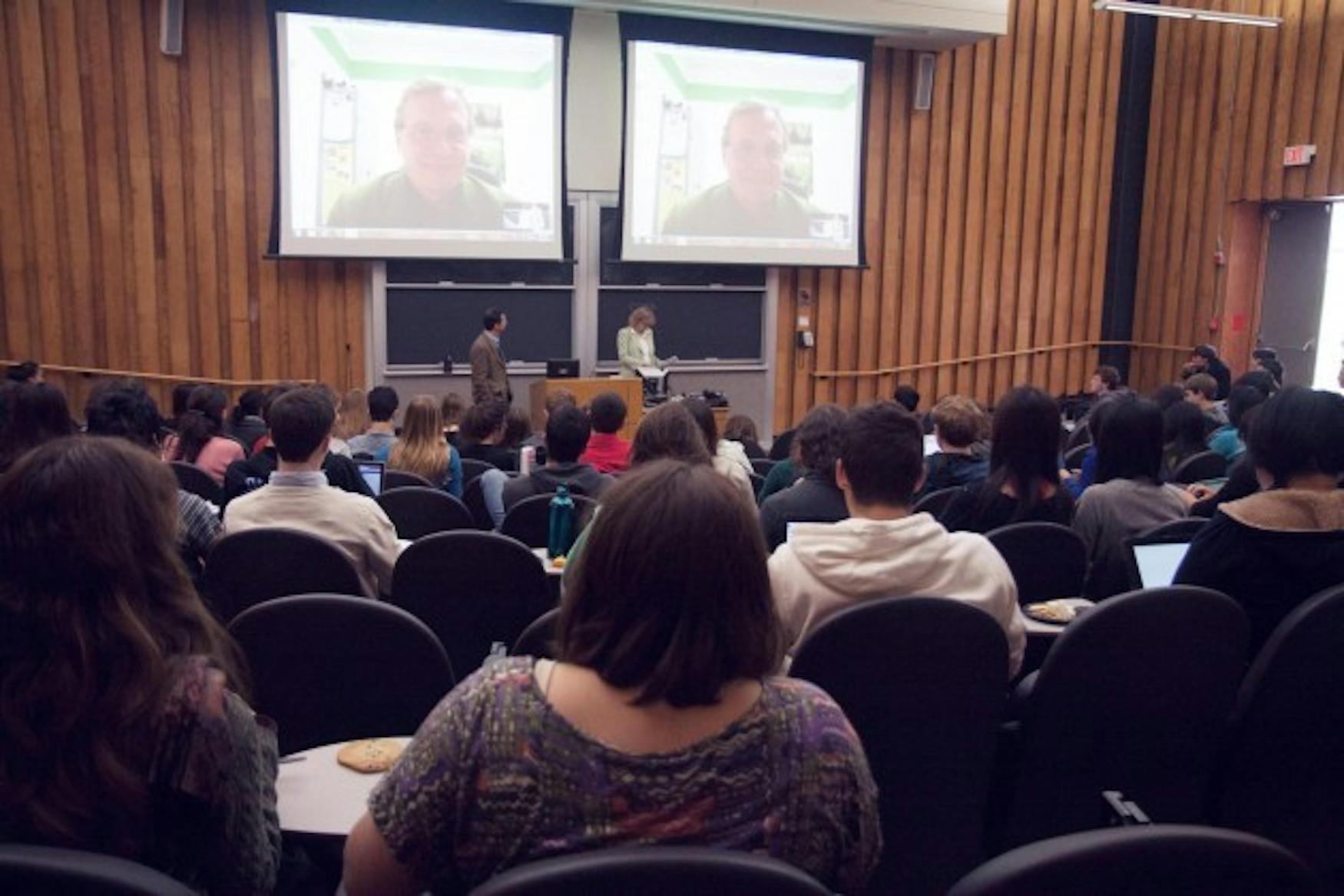German legislator talks to ENVS class
Last Friday Prof. Charles Chester (ENVS) and Prof. Sabine von Mering (GER) hosted Hermann Ott, a Green Party member of the German Parliament in Berlin, via Skype videoconference in Chester's "ENVS 2a: Fundamentals of Environmental Challenges" class to discuss the political role of environmental issues in Germany versus in the United States.
The discussion was the final lecture event in the Think Transatlantic! series, which began on Oct. 16 and was sponsored by the Center for German and European Studies at Brandeis and the German Embassy in Washington, D.C.
According to a flier for Think Transatlantic!, this year's series focuses on "key issues" of the U.S. elections. The series' goal, the flier states, is for "[e]xperts from both countries [to] come together to discuss what the US can learn from Germany and Germany's cooperation with other countries in Europe, and where and why our paths may diverge."
Addressing Chester's class from the projection screens in Olin-Sang room 101, Ott began by offering his condolences for Hurricane Sandy, which hit the East Coast of the United States early last week, and stated that fighting climate change has become more "visible" in the past week due to the storm.
Part of the reason why climate change has a larger and more definitive role in German politics is that the German parliamentary commission had already reached a consensus in 1990 on the presence of climate change, Ott said. Therefore, most of German society, believes that climate change is "real" and "anthropogenic," i.e. man-made, said Ott.
According to Ott, the secrets behind Germany's success in producing renewable energy are threefold. Firstly, the law regulating renewables has made it possible for people to get involved and be stakeholders; seven percent of wind power is owned by the people, he said.
Additionally, the legislation has "provided long-term investment ability and security" and people's investments are guaranteed a return, he continued. Lastly, those who implement green elements in their energy use are "guaranteed access to the grid," according to Ott.
However, there are improvements to be made to Germany's system, Ott added, including increased efforts in storing renewable energy.
"It is an industrial revolution, but it must be managed [and] ... structured," Ott said. "It is also important to have a positive vision of where we want to go."
Chester opened the floor to student questions and began with context on the U.S. elections. According to Chester, despite President Barack Obama being "recognized by the vast majority of environmental groups as the stronger candidate on the environment" than presidential candidate Gov. Mitt Romney, "the three most important environmental victories [and] achievements in the last 120 years in the United States ... were achieved by Republican administrations." These include the precedent of land conservation by President Theodore Roosevelt, the creation of the Environmental Protection Agency under President Richard Nixon and the ozone depletion treaty system instated under President Ronald Reagan.
"There's no simple breakdown between a pro-environment party [and] an anti-environment party," said Chester.
In response to a question from a student about how to gain support for long-term environmental policies during a recession, when people are more focused on the short-term, Ott said that "it is not easy."
"Awareness of climate change has dropped enormously," Ott said, and politicians are "grappling with that."
According to Ott, one method of keeping environmental issues in public discourse in the face of a recession is "pointing out certain similar roots of these crises," such as "shortsightedness of our behavior" and "plain greed" and acknowledging that there are short- and long-term issues "that need to be tackled at the same time."
In an interview with the Justice, von Mering said that Friday's discussion was the second event in the Think Transatlantic! series that was conducted over Skype. This provided a green format for the event because Ott did not have to fly from Germany, she said. Von Mering said that she hopes to hold more events with this format in the future.
*



Please note All comments are eligible for publication in The Justice.